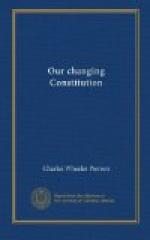It remains to notice briefly one or two Supreme Court decisions which are relied upon by the sponsors of the new tax law. Reference has already been made to the decision in the Spreckels case[1] which upheld the validity of the tax imposed by the War Revenue Act of 1898 upon the gross receipts of corporations engaged in the businesses of refining petroleum and refining sugar. The Court held the tax to be an excise tax “in respect of the carrying on or doing the business of refining sugar,” and such it obviously was. It was not a tax upon the privilege or franchise of doing business in a corporate capacity, like the tax now under debate. On the contrary, the act expressly applied to “every person, firm, corporation, or company carrying on or doing the business of refining sugar....” The case, therefore, has no bearing on the point we are discussing. Had the act applied only to corporations, a different question would have been involved.
[Footnote 1: Spreckels Sugar Refining Co. vs. McClain. 192 U.S., 397.]
The case of Veazie Bank vs. Fenno,[1] upholding the statute which taxed out of existence the circulation of the state banks, has frequently been cited as an authority sustaining the right of Congress to levy a tax upon a franchise or privilege granted by a state. It is true that in that case the eminent counsel for the bank (Messrs. Reverdy Johnson and Caleb Cushing) argued unsuccessfully “that the act imposing the tax impaired a franchise granted by the state, and that Congress had no power to pass any law which could do that;"[2] and that two justices dissented on that ground. The conclusive answer to this argument, was, however, that the power of the states to grant the particular right or privilege in question was subordinate to powers expressly conferred on Congress by the Constitution; that Congress was given power under the Constitution to provide a currency for the whole country, and the act in question was legislation appropriate to that end. The case does not hold that Congress has any general power to tax franchises or privileges granted by a state.
[Footnote 1: 8 Wall., 533.]
[Footnote 2: See 8 Wall., p. 535.]
The scope of this chapter does not admit of further reference to the decisions. It is strongly urged, however, that none of them, rightly construed, will be found to sustain the right of the General Government to impose a tax upon the exercise of franchises granted by a state in the exercise of its independent sovereignty, and that such a decision would mark a new departure in our jurisprudence.
In the debates in Congress over the bill many good lawyers appear to have assumed, somewhat too hastily, that the tax in question was an excise tax on business or occupation like that involved in the Spreckels case, and that the only constitutional question, therefore, was one of classification under the provision of the Constitution that excises shall be uniform throughout the United States. No less eminent a constitutional lawyer than Senator Bailey of Texas, in a colloquy with the junior Senator from New York, put the matter thus:[1]




